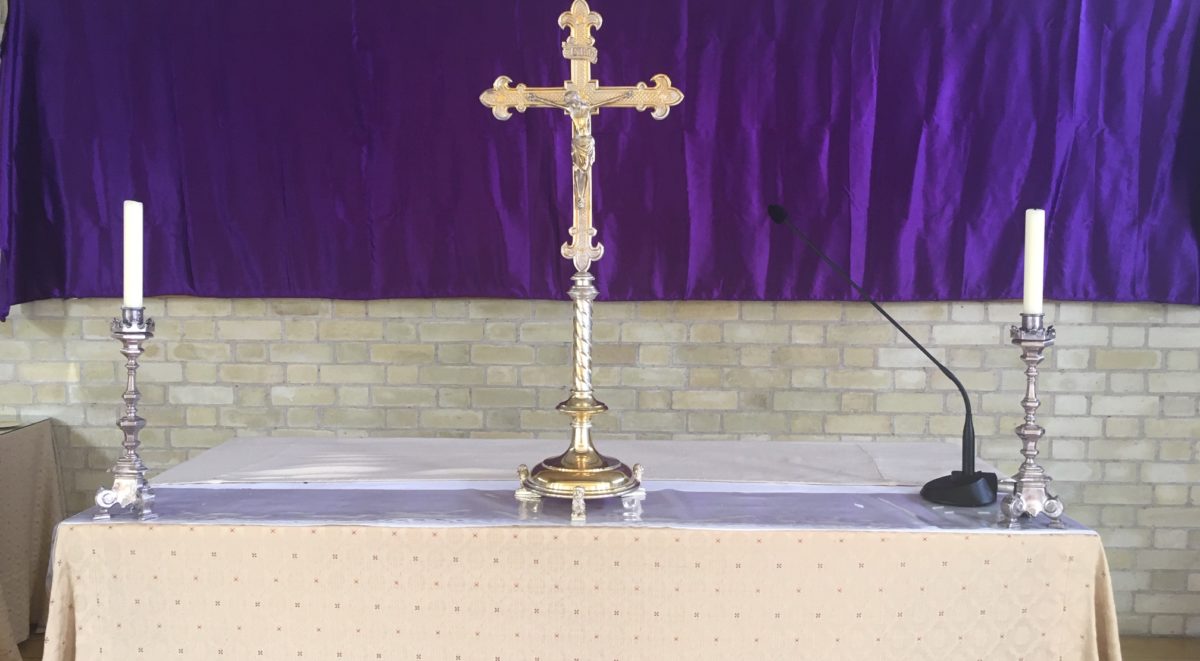
A meditation from the Prior, Fr Euan Marley OP: Palm Sunday, looking towards Good Friday and beyond – the Generation of the Cross.
In the Gospel of St Mark, the cross is laid upon Simon of Cyrene. Mark, and Mark alone, tells us that this Simon is the father of Alexander and Rufus. This is usually taken as a sign that the Gospel of St Mark was written for a community which was known to the writer of the Gospel. This is fair enough as a deduction, but it misses the real significance of the description of Simon the Cyrenaian as the father of Alexander and Rufus. To explain that, I need to look at the concept of generations.
‘Generation’ is rather an Old Testament concept. The Romans dated their past in terms of years, based not on a number, e.g. 2020, but on which two Romans were consul in a particular year. The year was important to them because it was a military division. Wars could not be fought with any great tenacity in the winter, so wars were summer wars. The coming of the winter was a time to assess the war, and the state of their society. The temple of Janus, the God whose name gives us the month of January, would have its doors closed in times of peace. Winter was a time of temporary peace as armies could not be moved easily then, and this is one important reason why festivals were often celebrated in winter when they were unlikely to be disrupted by invasions.
For the Old Testament, time was a matter of generations. This was a longer period than the year, though not an exact time. Generations had a moral dimension. One of the great insights of the Old Testament was the understanding that culture, commitment to ways of life, openness to God, as the prophets would have it, and the general make up of a society could change greatly over the years. We see that in our times, with great Catholic cultures losing faith and becoming hostile to Catholic thought and life. I am thinking of Ireland, of course, but also French Canada, as examples. So for the Old Testament, generation could be righteous or corrupt.
This goes right back to Noah, who is righteous, against the unrighteousness of the rest of humanity.
Gen. 7:1 Then the LORD said to Noah, “Go into the ark, you and all your household, for I have seen that you alone are righteous before me in this generation.
Generations were judged as a whole by God.
Deut. 1:35 “Not one of these—not one of this evil generation—shall see the good land that I swore to give to your ancestors.
So we should not be surprised that Christ speaks in terms of generations to his people. In fact, he sees himself as rejected by this generation, though individual members may stand against the majority.
Mark 8:38 Those who are ashamed of me and of my words in this adulterous and sinful generation, of them the Son of Man will also be ashamed when he comes in the glory of his Father with the holy angels.
The predominance of those who reject Christ does not mean that there are not those who accept him. This remains the way it is for Christianity to this day.
Yet it is in this adulterous and sinful generation, that Christ will work the redemption of humanity, beginning the way of mercy as Christs leads the faithful nthrough history.
Mark 13:30 Truly I tell you, this generation will not pass away until all these things have taken place.
Chapter 13 of the Gospel of Mark speaks of the recurrent pattern of the life of the world until Christ returns, that is to say, through many generations, but to understand that pattern, we look at the particular generation of Christ himself. It is in this generation that Son of Man would suffer, be rejected, be killed and rise again.
This is explained in a different way by Simon the Cyrenian, being the father of Alexander and Rufus. To understand this, we go back to the beginning of the passion narrative. As Jesus leaves Jericho, he encounters a blind man, Bartimaeus, who shouts to him, calling him the Son of David. This shows that the blind man still has a secular view of Christ, where Crist is to restore the ancient kingdom of David. Yet he is given his sight by Jesus. The blind man then follows him into the city of Jerusalem. Jericho is merely a stage in the journey to Jerusalem which he is to accomplish.
Look at Bartimaeus’ name. It means ‘son of Timaeus’, Bar being the Aramaic for son. Simon of Cyrene is identified in terms of his sons. So Bartimaeus and Simon belong to the same generation. Yet Bartimaeus is described in terms of the past, as the Son of Alphaeus, while Simon is described in terms of the future, being the Father of Alexander and Rufus. These two being in all probability Christians.
It is in their generation that the redeeming work of Christ is done. The past, the earthly kingdom of David will not return. Bartimaeus is to see a very different restoration of the kingdom, but what will begin here is the life of the Church, epitomised by the naming of Alexander and Rufus. All redemption happens in this generation, so much so that we still belong to that generation. Yet remember that all generations pass too. Only the words of Christ remain (Mark 13:31). Heaven and earth will pass away but my words will not pass away.
For more thoughts on Simon of Cyrene, see Sr. Ann Catherine’s poem.
